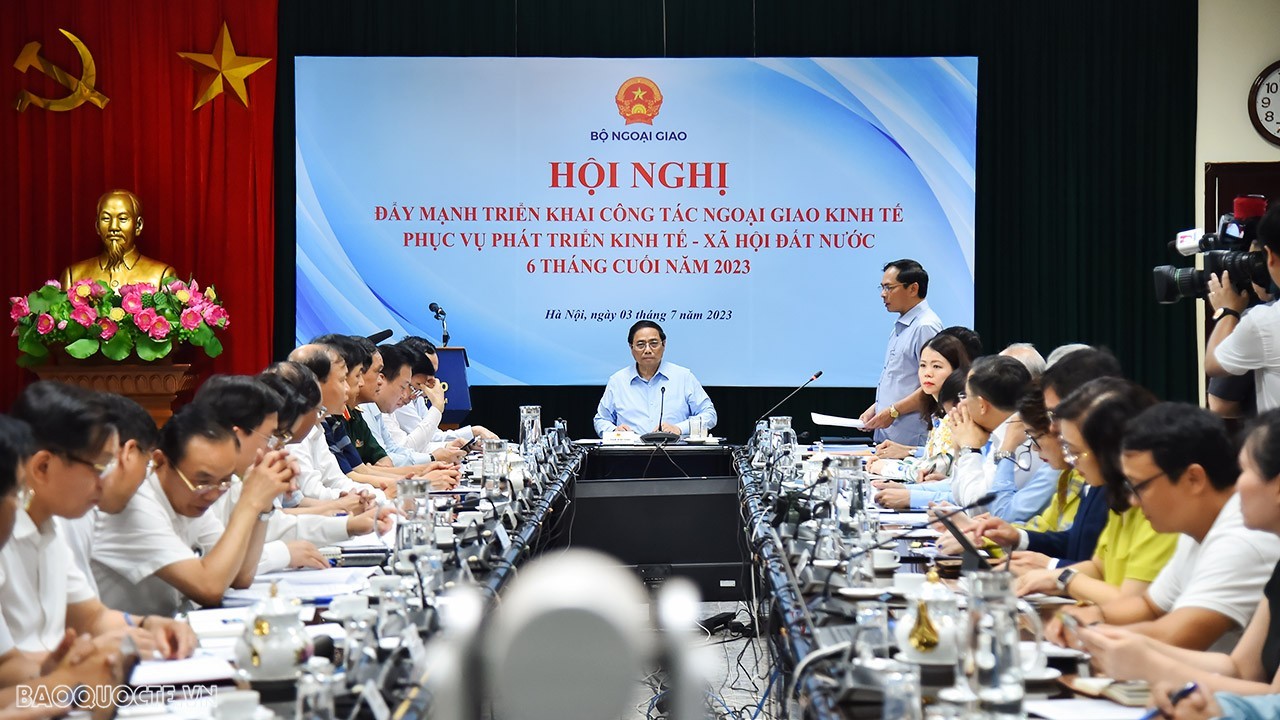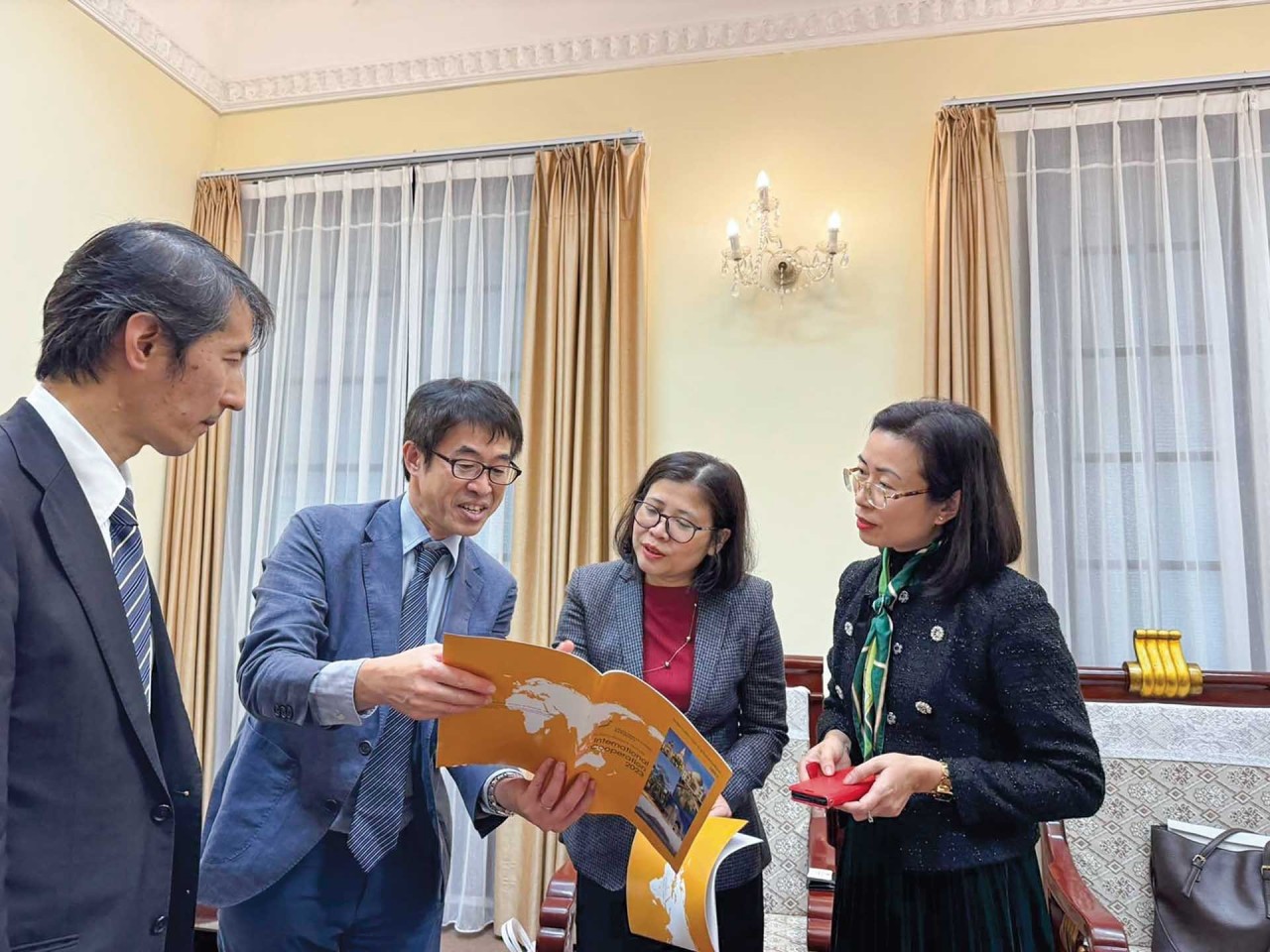
Economic diplomacy: A crucial driving force for rapid and sustainable development
Latest
 |
| On July 3, Prime Minister Pham Minh Chinh attended the Ministry of Foreign Affairs’ virtual conference on promoting the implementation of economic diplomacy, serving socio-economic development in the last half of 2023. (Photo: WVR/Tuan Anh) |
Since the 31st Diplomatic Conference, the global economy has continued facing difficulties, with a fragile recovery and numerous underlying risks and challenges, has significantly impacted various sectors in Vietnam, such as production, exports, tourism, and investment, necessitating urgent and resolute economic diplomacy efforts in this new context.
From perception to action
Leveraging the achievements and spirit of vaccine diplomacy, closely aligning with the directives of the Party General Secretary at the National Foreign Affairs Conference and of the Prime Minister at the 31st Diplomatic Conference as well as the guidance and management of the Government and the Prime Minister, since the beginning of 2022, economic diplomacy efforts has swiftly shifted focus from contributing to pandemic prevention to serving economic recovery and development. Building upon this foundation, economic diplomacy endeavors have been comprehensively and systematically deployed, forging new directions and making substantial contributions to socio-economic recovery with numerous positive outcomes.
The institutionalization and framework establishment for economic diplomacy were promptly carried out. On August 10, 2022, the Party Central Committee’s Secretariat issued Directive No. 15-CT/TW, delineating the focal tasks of economic diplomacy until 2030. This helped concretize the Party’s development strategies and orientations set forth at the 13th Party Congress, transforming economic diplomacy into a fundamental and central task, a crucial driving force for rapid and sustainable national development.
On February 20, 2023, in order to implement Directive No. 15-CT/TW, the Government issued its first-ever action programme on accelerating economic diplomacy for national development for the period from 2022 to 2026. These documents truly induced a robust shift from mindset and perception to action in economic diplomacy implementation across ministries, departments, sectors, and localities.
In over 110 foreign affairs activities between 2022-2023 involving key leaders and high-ranking officials, economic substance took center stage and was actively promoted. Strategic partner frameworks were elevated, breakthrough cooperation frameworks were established, and hundreds of economic agreements were signed. Relationships with 30 strategic partners and comprehensive partners were strengthened through the elevation of relations with China, the United States, South Korea, Japan, and the establishment of sectoral strategic partnerships with Singapore, Denmark, Luxembourg, and several other partners.
 |
| Department of Economic Affairs, Ministry of Foreign Affairs, in a meeting with Japanese partner. (Photo: WVR) |
Localities and businesses have become the focal point in the implementation of economic diplomacy. The Ministry of Foreign Affairs has actively supported and facilitated international cooperation, resolved difficulties in various sectors such as agriculture, tourism, and key export sectors like textiles, footwear, agriculture, forestry, and aquaculture. Efforts to support localities in promoting international economic relations were intensified. Timely dissemination of information to businesses regarding international trade trends, new regulations, trade defense risks and business risks was carried out. Vietnam’s overseas representative agencies actively participated in addressing issues and protecting the legitimate rights of Vietnamese businesses.
International economic integration and connectivity were significantly strengthened, achieving tangible results. Ministries, branches, localities, and enterprises made efficient efforts in implementing the 15 signed Free Trade Agreements (FTAs), concluding FTA negotiations with Israel, and driving negotiations with potential partners such as EFTA, UAE, Turkey, Mercosur. Vietnam has made appropriate, balanced, and harmonious steps in response to the economic linkage initiatives of major partners.
In order to concretize the strong commitment made at the COP 26 to achieve carbon neutrality by 2050, Vietnam has successfully started attracting investments in green and high-tech projects, research and development centers. It is also boosting investment attraction in strategic and breakthrough sectors like the semiconductor industry. New cooperation directions such as Halal industry development and trilateral agricultural cooperation were emphasized to further leverage agricultural strengths, effectively tap into potential markets, and contribute to global food security. Efforts in lobbying for the recognition of the market economy regulations have achieved new advancements.
Realizing the strategic goals for 2030 and 2045
The year 2024 signifies a shift into the latter half of the 2021-2025 Socio-Economic Development Plan, a phase that demands acceleration, breakthroughs and holds decisive significance to successfully implement the resolutions of the 13th Party Congress. This period lays a important foundation towards the strategic goals for 2030 and 2045.
To make substantial and effective contributions to the goals of 2030 and 2045, in the coming period, economic diplomacy will continue to adhere closely to the focal tasks outlined in Directive No. 15-CT/TW of the Party Central Committee’s Secretariat. Regular updates and adjustments will be made to align with real-time requirements.
On this basis, economic diplomacy will focus on robustly supporting the economic growth drivers such as exports, investments, while emphasizing the attraction of resources in technology, expertise, and capital, especially in high-tech and green finance—to facilitate new growth dynamics like digital transformation, innovative renewal, and green economics for sustainable development.
The economic substance remains pivotal in foreign affairs, especially at high-level engagements, contributing to deepening relationships, intertwining interests with bilateral and multilateral partners. High-level economic diplomacy will be a crucial front to continually maintain peace and stability, opening new cooperative frameworks to realistically serve the nation’s development.
The mission centered on people, localities, and enterprises will be actively deployed, closely aligning with domestic practical needs and maximizing the spirit of pioneering and accompanying.
Strategic research and counsel will remain a fundamental and core task, putting special emphasis on the continuously improvement of quality, sensitivity, and timeliness, in service of the formulation of the Party’s economic guidelines and the Government’s socio-economic policies.
The Ministry of Foreign Affairs will also focus on training and enhancing the capibilities of officers working in the field of economic diplomacy, meeting the escalating demands for reinforcing economic diplomacy to serve the country’s development and extensive integration process.
Building upon past achievements, with the highest determination and a sense of urgency, determination, flexibility, and innovation, ultilization of every opportunity for national development, the Ministry of Foreign Affairs and Vietnam’s representative agencies abroad will proactively and closely coordinate with ministries, branches, localities, and enterprises to further intensify economic diplomacy. This aims to truly make economic diplomacy a crucial driver for the rapid and sustainable development of the country.

























